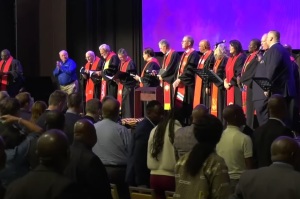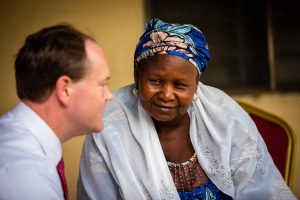Elton John Wants to Show Vladimir Putin How Dangerous Gay Propaganda Law Is
Just days after Russian President Vladimir Putin praised Sir Elton John "despite his orientation," the music icon said he wants to show the Russian leader how the country's controversial law that seeks to protect children from gay "propaganda" is dangerous to LGBT people.
Recounting his positive experiences performing in Russia since 1979, the world famous singer-songwriter posted a statement on his official website concerning the controversy around the anti-propaganda law signed by Putin last year, which makes it illegal for anyone to spread information about the lesbian, gay, bisexual and transgender community to minors.
"It was very clear to me that, although foreigners like myself who are visiting Russia are not affected by this new law (and President Putin has recently confirmed this), it is a very different story for those living inside the country," John wrote.
"Whatever the intention of Russia's homosexuality and pedophilia propaganda laws, I am absolutely clear from my own personal experience that it is proving deeply dangerous to the LGBT community and deeply divisive to Russian society," he continued, adding that he would like the opportunity to speak with Putin the next time he visits Russia and introduce him to some of his LGBT friends there.
Russia's "propaganda" law, signed by the president in June, has recently been gaining global attention with the 2014 Winter Olympic Games scheduled to start in Sochi on Feb. 7.
Putin has clarified that gay people can feel "safe and free" during the games, but warned that they need to "leave our children in peace."
"We don't outlaw anything and don't nab anyone," the Russian president said at a press event last week. "Our law prescribes no responsibility for these kinds of relationships unlike laws in some other countries do."
Putin has also shared his admiration for John, who has a same-sex civil partner, and earlier this week noted that millions of Russians love him despite his sexual orientation.
"People have different sexual orientation. We will welcome all athletes and all guests of the Olympics," the Russian leader told foreign journalists, and added that John is "an outstanding person [and] outstanding musician."
On his website, the musician shared that he still felt "warmth and welcome" from Russian audiences when he last visited in December 2013, despite the passing of the anti-propaganda law.
He revealed, however, that he made a trip to meet with members of the LGBT community in Moscow, and came to the conclusion that the bill constituted "vicious homophobia" that has given "extremists" the cover to abuse human rights.
"The people I met in Moscow – gay men and lesbians in their 20′s, 30′s and 40′s – told me stories about receiving threats from vigilante groups who would 'cure' them of homosexuality by dousing them with urine or beating them up," he noted.
"One young man was stalked outside a gay club by someone posing as a taxi driver who tried to garrotte him with a guitar string because he was a 'sodomite.' Everyone shared stories of verbal and physical abuse – at work, in bars and restaurants or in the street – since the legislation came into force last June."
He concluded that he would like to introduce Putin to some of the people he met, who he called "decent, kind, patriotic men and women who had no thought of forcing their sexuality on anyone."





























